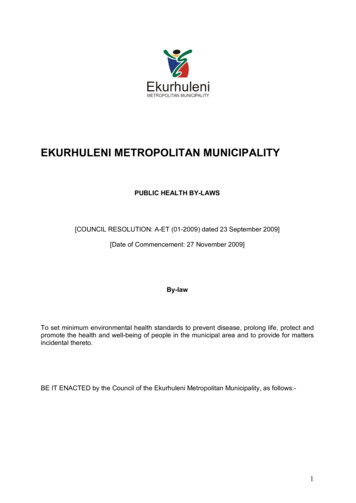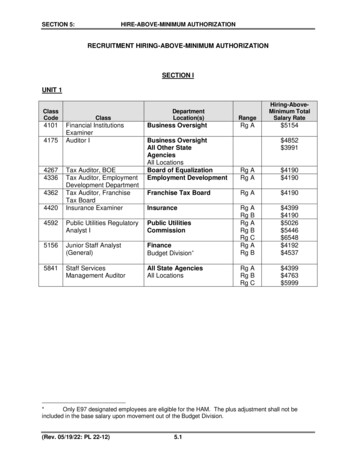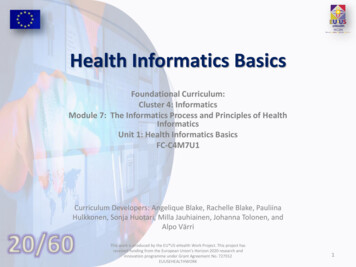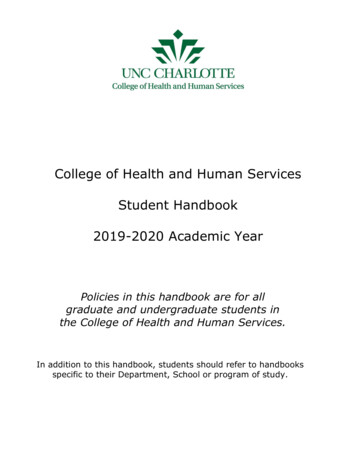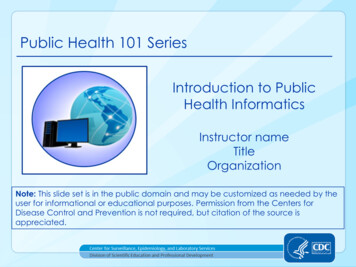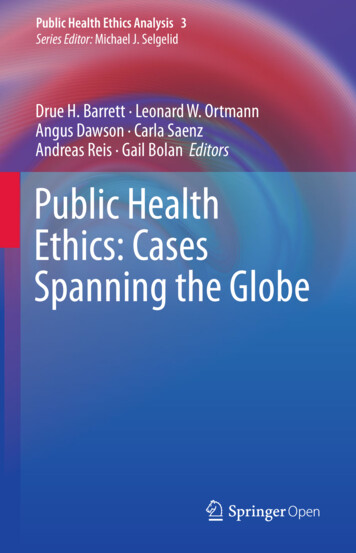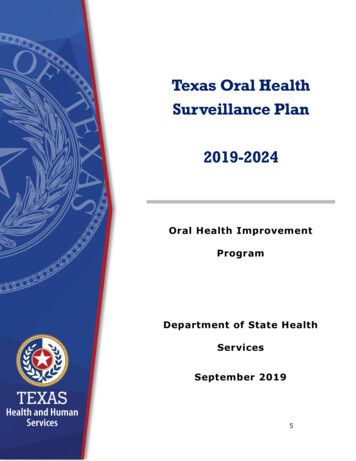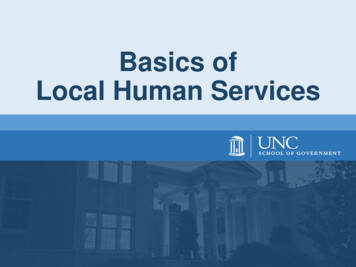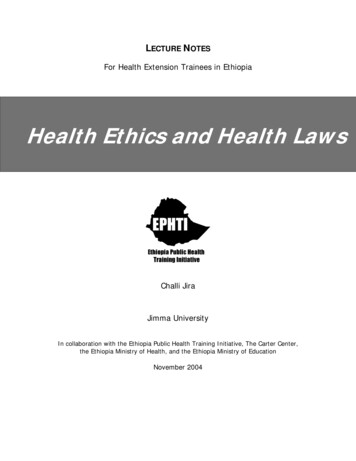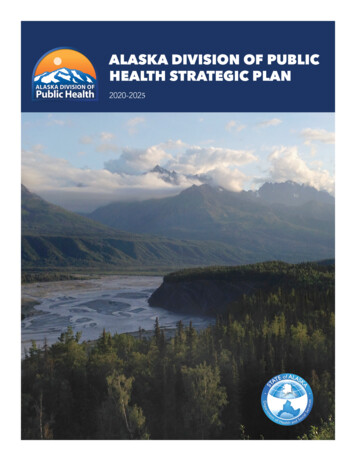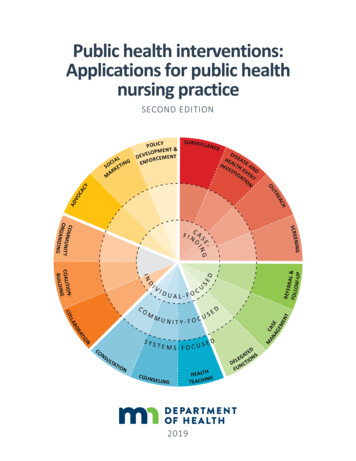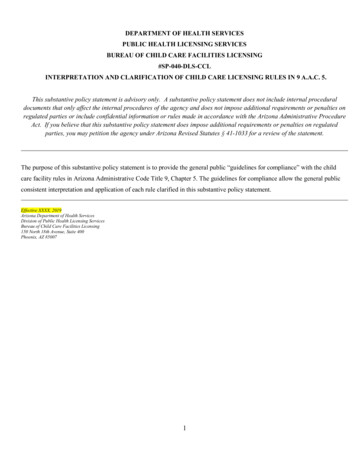
Transcription
DEPARTMENT OF HEALTH SERVICESPUBLIC HEALTH LICENSING SERVICESBUREAU OF CHILD CARE FACILITIES LICENSING#SP-040-DLS-CCLINTERPRETATION AND CLARIFICATION OF CHILD CARE LICENSING RULES IN 9 A.A.C. 5.This substantive policy statement is advisory only. A substantive policy statement does not include internal proceduraldocuments that only affect the internal procedures of the agency and does not impose additional requirements or penalties onregulated parties or include confidential information or rules made in accordance with the Arizona Administrative ProcedureAct. If you believe that this substantive policy statement does impose additional requirements or penalties on regulatedparties, you may petition the agency under Arizona Revised Statutes § 41-1033 for a review of the statement.The purpose of this substantive policy statement is to provide the general public “guidelines for compliance” with the childcare facility rules in Arizona Administrative Code Title 9, Chapter 5. The guidelines for compliance allow the general publicconsistent interpretation and application of each rule clarified in this substantive policy statement.Effective XXXX, 2019Arizona Department of Health ServicesDivision of Public Health Licensing ServicesBureau of Child Care Facilities Licensing150 North 18th Avenue, Suite 400Phoenix, AZ 850071
Arizona Department of Health ServicesBUREAU OF CHILD CARE facilities/index.phpARIZONA ADMINISTRATIVE CODEAND ARIZONA REVISED STATUTESFOR CHILD CARE FACILITIESMISSION STATEMENT“To monitor the health, safety and well beingof children in child care centers and child caregroup homes throughout Arizona by regulating, establishingand enforcing appropriate rules, and byproviding technical assistance and trainingto caregivers, and by providing consumer education.”Effective September 30, 20102
Table of ContentsARTICLE 1. GENERAL6R9-5-101. Definitions6R9-5-102. Individuals to Act for Applicant or Licensee Regarding Document, Fingerprinting, and Department-ProvidedTraining Requirements11ARTICLE 2. FACILITY LICENSURER9-5-201. Application for a LicenseR9-5-202. Time-framesTable 2.1. Time-Frames (In Calendar Days)R9-5-203. Fingerprinting Requirements and Central Registry RequirementsR9-5-204. Child Care Service ClassificationsR9-5-205. Submission of Licensure FeesR9-5-206. Licensure FeesR9-5-207. Invalid LicenseR9-5-208. Changes Affecting a LicenseR9-5-209. Inspections; InvestigationsR9-5-210. Denial, Revocation, or Suspension of LicenseARTICLE 3. FACILITY ADMINISTRATIONR9-5-301. General Licensee ResponsibilitiesR9-5-302. Statement of Child Care ServicesR9-5-303. Posting of NoticesR9-5-304. Enrollment of ChildrenR9-5-305. Child Immunization RequirementsR9-5-306. Admission and Release of Children; Attendance RecordsR9-5-307. Suspected or Alleged Child Abuse or NeglectR9-5-308. Insurance RequirementsR9-5-309. Gas and Fire InspectionsR9-5-310. 6272728ARTICLE 4. FACILITY STAFFR9-5-401. Staff QualificationsR9-5-402. Staff Records and ReportsR9-5-403. Training RequirementsR9-5-404. Staff-to-Children Ratios2828303132ARTICLE 5. FACILITY PROGRAM AND EQUIPMENTR9-5-501. General Child Care Program, Equipment, and Health and Safety StandardsR9-5-502. Supplemental Standards for InfantsR9-5-503. Standards for Diaper ChangingR9-5-504. Supplemental Standards for 1-year-old and 2-year-old ChildrenR9-5-505. Supplemental Standards for 3-year-old, 4-year-old, and 5-year-old ChildrenR9-5-506. Supplemental Standards for School-age ChildrenR9-5-507. Supplemental Standards for Children with Special Needs34343740424343433
R9-5-508. General Nutrition StandardsTable 5.1. Meal Pattern Requirements For ChildrenR9-5-509. General Food Service and Food Handling StandardsR9-5-510. Discipline and GuidanceR9-5-511. Sleeping and NappingR9-5-512. Cleaning and SanitationR9-5-513. Pets and AnimalsR9-5-514. Accident and Emergency ProceduresR9-5-515. Illness and InfestationR9-5-516. MedicationsR9-5-517. TransportationR9-5-518. Field Trips454647495051525354555759ARTICLE 6. PHYSICAL PLANT OF A FACILITYR9-5-601. General Physical Plant StandardsR9-5-602. Facility Square Footage RequirementsR9-5-603. Outdoor Activity AreasR9-5-604. Swimming PoolsR9-5-605. Fire and Safety60CHAPTER 2. DEPARTMENT OF HEALTH SERVICES, TOBACCO-RELATED PROGRAMS:67ARTICLE 1. SMOKE-FREE ARIZONA67ARIZONA REVISED STATUTES, TITLE 36, CHAPTER 7.1, ARTICLES 1, 3, 5, CHILD CARE PROGRAMS§ 36-881. Definitions§ 36-882. License; posting; transfer prohibited; fees; provisional license; renewal; exemption from rule making§ 36-883. Standards of care; rules; classifications§ 36-883.01.Statement of services§ 36-883.02.Child care personnel; fingerprints; exemptions; definition§ 36-883.03.Employer-subsidized child care; immunity from liability§ 36-883.04.Standards of care; rules; enforcement§ 36-883.05.Child care facilities; infants; floor bedding; requirements; emergency evacuation; notice; definitions§ 36-884. Exemptions§ 36-885. Inspection of child care facilities§ 36-886. Operation without a license; classification.§ 36-886.01.Injunctions.§ 36-887. Procedure for inspection of records.§ 36-888. Denial, revocation or suspension of license§ 36-889. Licensees; applicants; residency; controlling persons; requirements§ 36-890. Decisions§ 36-891. Civil penalty; inspection of centers; training program§ 36-891.01.Intermediate sanctions; notification of compliance; hearing§ 36-892. Violation; classification§ 36-893. Legal action or sale; effect on 960606162644
§ 36-894. Medical marijuana; child care facilities; prohibition§ 36-894.01.Use of sunscreen in child care facilities7979ARTICLE 3.§ 36-895.PLACEMENT OF CHILDREN BY DEPARTMENT OF ECONOMIC SECURITYLicensing and monitoring of child care facilities; financial agreements7979ARTICLE 5.§ 36-898.NOTIFICATION OF PESTICIDE APPLICATIONLicensees; pesticide application; notice; definitions79795
ARTICLE 1. GENERALR9-5-101.DefinitionsIn addition to the definitions in A.R.S. § 36-881, the following definitions apply in this Chapter unless otherwise specified:1.“Abuse” has the same meaning as in A.R.S. § 8-201.2.“Accident” means an unexpected occurrence that:a. Causes injury to an enrolled child,b. Requires attention from a staff member, andc. May or may not be an emergency.3.“Accommodation school” has the same meaning as in A.R.S. § 15-101.4.“Accredited” means approved by the:a.New England Commission of Institution of Higher Education,b.Middle States Commission of Higher Education,c.North Central the Higher Learning Commission,d.Northwest Commission on Colleges and Universities,e.Commission on Colleges, orf.Western Association of Schools and Colleges.5.“Activity” means an action planned by a licensee and performed by an enrolled child while supervised by astaff member.6.“Activity area” means a specific indoor or outdoor space or room of a licensed facility that is designated bya licensee for use by an enrolled child for an activity.7.“Adaptive device” means equipment used to augment an individual’s use of the individual’s arms, legs,sight, hearing, or other physical part or function.8.“Administrative completeness review time frame” has the same meaning as in A.R.S. § 41-1072.9.“Adult” means an individual who is at least 18 years of age.10.“Age-appropriate” means consistent with a child’s age and age-related stage of physical growth and mentaldevelopment.11.“Agency” means any board, commission, department, office, or other administrative unit of the federalgovernment, the state, or a political subdivision of the state.12.“Applicant” means a person or governmental agency requesting one of the following:a.A license, orb.Approval of a change affecting a license under R9-5-208.13.“Application” means the documents that an applicant is required to submit to the Department for licensure orapproval of a request for a change affecting a license.14.“Assistant teacher-caregiver” means a staff member who aids a teacher-caregiver in planning, developing, orconducting child care activities.15.“Association” means a group of individuals other than a corporation, limited liability company, partnership,joint venture, or public school who has established a governing board and bylaws to operate a facility.16.“Beverage” means a liquid for drinking, including water.17.“Business organization” has the same meaning as “entity” in A.R.S. § 10-140.18.“Calendar day” means each day, not including the day of the act, event, or default from which a designatedperiod of time begins to run, but including the last day of the period unless it is a Saturday, Sunday, or legalholiday, in which case the period runs until the end of the next day that is not a Saturday, Sunday, or legalholiday.19.“Calendar week” means a seven-day period beginning on Sunday at 12:00 a.m. and ending on Saturday at11:59 p.m.20.“C.C.P.” means Certified Childcare Professional, a credential awarded by the National Child Care Association.21.“C.D.A.” means Child Development Associate, a credential awarded by the Council for ProfessionalRecognition.22.“Change in ownership” means a transfer of controlling legal or controlling equitable interest and authority in afacility resulting from a sale or merger of a facility.23.“Charter school” has the same meaning as in A.R.S. § 15-101.24.“Child care experience” means an individual’s documented work with children in:6
41.42.43.44.45.A child care facility or a child care group home that was licensed, certified, or approved by a state inthe United States or by one of the Uniformed Services of the United States;b.A public school, a charter school, a private school, or an accommodation school;c.A public or private educational institution authorized under the laws of another state whereinstruction was provided for any grade or combination of grades between pre-kindergarten and grade12; ord.One of the following professional fields:i. Nursing,ii. Social work,iii. Psychology,iv. Child development, orv. A closely-related field.“Child care services” means the range of activities and programs provided by a licensee to an enrolled child,including personal care, supervision, education, guidance, and transportation.“Child with special needs” means:a.A child with a health care provider’s diagnosis and record of a physical or mental condition thatsubstantially limits the child in providing self-care or performing manual tasks or any other majorlife function such as walking, seeing, hearing, speaking, breathing, or learning;b.A child with a “developmental disability” as defined in A.R.S. § 36-551; orc.A “child with a disability” as defined in A.R.S. § 15-761.“Clean” means to remove dirt or debris by methods such as washing with soap and water, vacuuming, wiping,dusting, or sweeping.“Closely-related field” means any educational instruction or occupational experience pertaining to the growth,development, physical or mental care, or education of children.“Communicable disease” has the same meaning as in A.A.C. R9-6-101.“Compensation” means money or other consideration, including goods, services, vouchers, time, government orpublic expenditures, government or public funding, or another benefit, that is received as payment.“Corporal punishment” means any physical action used to discipline a child that inflicts pain to the body of thechild, or that may result in physical injury to the child.“CPR” means cardiopulmonary resuscitation.“Credit hour” means an academic unit earned at an accredited college or university:a.By attending a one-hour class session each calendar week during a semester or equivalent shortercourse term, orb.Completing practical work for a course as determined by the accredited college or university.“Designated agent” means an individual who meets the requirements in A.R.S. § 36-889(D).“Developmentally-appropriate” means consistent with a child’s physical, emotional, social, cultural, andcognitive development, based on the child’s age and family background and the child’s personality, learningstyle, and pattern and timing of growth.“Discipline” means the on-going process of helping a child develop self-control and assume responsibility forthe child’s own actions.“Documentation” means information in written, photographic, electronic, or other permanent form.“Electronic signature” has the same meaning as in A.R.S. § 41-351(9).“Emergency” means a potentially life-threatening occurrence involving an enrolled child or staff member thatrequires an immediate response or medical treatment.“Endanger” means to expose an individual to a situation where physical injury or mental injury to theindividual may occur.“Enrolled” means placed by a parent and accepted by a licensee for child care services.“Evening and nighttime care” means child care services provided between the hours of 8:00 p.m. and 5:00a.m.“Facility” has the same meaning as “child care facility” in A.R.S. § 36-881.“Facility director” means an individual who is designated by a licensee as the individual responsible for thedaily onsite operation of a facility.“Facility premises” means property that is:7
1.62.63.64.65.66.67.Designated on an application for a license by the applicant, andLicensed for child care services by the Department under A.R.S. Title 36, Chapter 7.1, Article 1, andthis Chapter.“Fall zone” means the surface under and around a piece of equipment onto which a child falling from orexiting from the equipment would be expected to land.“Field trip” means an activity planned by a staff member for an enrolled child:a.At a location or area that is not licensed for child care services by the Department, orb.At a child care facility in which the child is not enrolled.“Final construction drawings” means facility plans that include the architectural, structural, mechanical,electrical, fire protection, plumbing, and technical specifications of the physical plant and the facility premisesand that have been approved by local government for the construction, alteration, or addition of a facility.“Food” means a raw, cooked, or processed edible substance, ice, beverage, or ingredient used or intended foruse or for sale in whole or in part for human consumption, or chewing gum.“Food preparation” means processing food for human consumption by cooking or assembling the food, butdoes not include distributing prepackaged food or whole fruits or vegetables.“Full-day care” means child care services provided for six or more hours per day between the hours of 5:00a.m. and 8:00 p.m.“Governmental agency” has the same meaning as in A.R.S. § 44-7002.“Guidance” means the ongoing direction, counseling, teaching, or modeling of generally accepted socialbehavior through which a child learns to develop and maintain the self-control, self-reliance, and self-esteemnecessary to assume responsibilities, make daily living decisions, and live according to generally acceptedsocial behavior.“Hazard” means a source of endangerment.“Health care provider” means a physician, physician assistant, or registered nurse practitioner.“High school equivalency diploma” means:a.A document issued by the State Board of Education under A.R.S. § 15-702 to an individual whopasses a general educational development test or meets the requirements of A.R.S. § 15-702(B);b.A document issued by another state to an individual who passes a general educational developmenttest or meets the requirements of a state statute equivalent to A.R.S. § 15-702(B); orc.A document issued by another country to an individual who has completed that country’s equivalent ofa 12th grade education, as determined by the Department based upon information obtained fromAmerican or foreign consulates or embassies or other governmental agencies.“Hours of operation” means the specific time during a day for which a licensee is licensed to provide child careservices.“Illness” means physical manifestation or signs of sickness, such as pain, vomiting, rash, fever, discharge, ordiarrhea.“Immediate” or “immediately” means without restriction, delay, or hesitation.“Inaccessible” means:a.Out of an enrolled child’s reach, orb.Locked.“Infant” means:a.A child 12 months of age or younger, orb.A child 18 months of age or younger who is not yet walking.“Infant care” means child care services provided to an infant.“Infestation” means the presence of lice, pinworms, scabies, or other parasites.“Inspection” means:a.Examination of a facility by the Department to determine compliance with A.R.S. Title 36, Chapter7.1, Article 1, and this Chapter;b.Review of facility documents, records, or reports by the Department; orc.Examination of a facility by a local governmental agency.“Lesson plan” means a written description of the activities scheduled in each activity area for a day.“License” means the written authorization issued by the Department to operate a facility in Arizona.“Licensed applicator” who complies with A.A.C. R3-8-201(C).8
.85.86.87.88.89.90.91.92.93.94.95.96.“Licensed capacity” means the maximum number of enrolled children for whom a licensee is authorized by theDepartment to provide child care services in a facility or a part of a facility at any given time.“Licensee” means a person or governmental agency to whom the Department has issued a license to operate afacility in Arizona.“Local” means under the jurisdiction of a city or county in Arizona.“Mat” means a foam pad that has a waterproof cover and is of sufficient size and thickness to accommodatethe height, width, and weight of a reclining child’s body.“Medication” means a substance prescribed by a physician, physician assistant, or registered nurse practitioneror available without a prescription for the treatment or prevention of illness or infestation.“Menu” means:a.A written description of the food that a facility provides and serves as a meal or snack, orb.The combination of food that a facility provides and serves as a meal or snack.“Motor vehicle” has the same meaning as in A.R.S. § 28-101.“N.A.C.” means the National Administrator Credential, a credential issued by the National Institute of ChildCare Management.“Name” means, for an individual, the individual’s first name and the individual’s last name.“Naptime” means any time during hours of operation, other than evening and nighttime hours, that isdesignated by a licensee for the rest or sleep of enrolled children.“Neglect” has the same meaning as in A.R.S. § 8-201.“One-year-old” means a child who is not an infant and at least 12 months of age but not yet two years of age.“Outbreak” has the same meaning as in R9-6-101.“Overall time-frame” has the same meaning as in A.R.S. § 41-1072.“Parent” means:a.A natural or adoptive mother or father,b.A legal guardian appointed by a court of competent jurisdiction, orc.A “custodian” as defined in A.R.S. § 8-201.“Part-day care” means child care services provided for fewer than six hours per day between the hours of 5:00a.m. and 8:00 p.m.“Perishable food” means food that becomes unfit for human consumption if not stored to prevent spoilage.“Pesticide”" has the same meaning as in A.R.S. § 32-3601.“Pesticide label” means the written, printed, or graphic matter approved by the United States EnvironmentalProtection Agency on, or attached to, a pesticide container.“Physical injury” means temporary or permanent damage or impairment to a child’s body.“Physical plant” means a building that houses a facility, or the licensed areas within a building that houses afacility, including the architectural, structural, mechanical, electrical, plumbing, and fire protection elements ofthe building.“Physician” means an individual licensed as a doctor of:a.Allopathic medicine under A.R.S. Title 32, Chapter 13;b.Naturopathic medicine under A.R.S. Title 32, Chapter 14;c.Osteopathic medicine under A.R.S. Title 32, Chapter 17;d.Homeopathic medicine under A.R.S. Title 32, Chapter 29; ore.Allopathic, naturopathic, osteopathic, or homeopathic medicine under the law of another state.“Physician assistant” means:a.An individual who is licensed under A.R.S. Title 32, Chapter 25; orb.An individual who is licensed as a physician assistant under the law of another state.“Private pool” has the same meaning as “private residential swimming pool” in A.A.C. R18-5-201.“Private school” has the same meaning as in A.R.S. § 15-101.“Program” means a variety of activities organized and conducted by a staff member.“Public pool” has the same meaning as “public swimming pool” in A.A.C. R18-5-201.“Public school” has the same meaning as “school” in A.R.S. § 15-101.“Registered nurse practitioner” means:a.An individual who is licensed and certified as a “registered nurse practitioner” under A.R.S. §32-1601, or9
.110.111.112.113.114.An individual who is licensed or certified as a registered nurse practitioner under the law of anotherstate.“Regular basis” means at recurring, fixed, or uniform intervals.“Responsible party” means an individual or a group of individuals who:a.Is assigned by a public school, charter school, or governmental agency; andb.Has general oversight of the child care facility.“Sanitize” means to use heat, chemical agents, or germicidal solutions to disinfect and reduce pathogen counts,including bacteria, viruses, mold, and fungi.“School-age child” means a child who:a.Meets one of the following:i. Is five years old on or before January 1 of the current school year, orii. Is five years old on or before January 1 of the most recent school year; andb.Meets one of the following:i. Attends kindergarten or a higher level program in a public, charter, accommodation, or privateschool during the current school year;ii. Attended kindergarten or a higher level program in a public, charter, accommodation, or privateschool during the most recent school year;iii. Is home-schooled at a kindergarten or higher level during the current school year; oriv. Was home-schooled at a kindergarten or higher level during the most recent school year.“School-age child care” means child care services provided to a school-age child.“School campus” means the contiguous grounds of a public, charter, accommodation, or private school,including the buildings, structures, and outdoor areas available for use by children attending the school.“School governing board” has the same meaning as “governing board” in A.R.S. § 15-101."Screen time" means the use of electronic media to watch television or to watch a video, a DVD, or a movie atthe facility or at another location or the use of electronic media or a computer for game-playing, entertainment,communication, or educational purposes.“Semi-public pool” has the same meaning as “semi-public swimming pool” in A.A.C. R18-5-201.“Service classification” means one of the following:a.Full-day care;b.Part-day care;c.Evening and nighttime care;d.Infant care;e.One-year-old child care;f.Two-year-old child care;g.Three-year-old, four-year-old, and five-year-old child care;h.School-age child care; ori.Weekend care.“Signatory” means an individual who is authorized by a school district governing board, school districtsuperintendent, or governmental agency to sign a document on behalf of the school district governing board,school district superintendent, or governmental agency.“Signed” means affixed with an individual’s signature or with a symbol representing an individual’s signatureif the individual is unable to write the individual’s name.“Sippy cup” means a lidded drinking container that is designed to be leak proof or leak-resistant and fromwhich a child drinks through a spout or straw.“Space utilization” means the designated use of an area within a facility for specific child care services oractivities.“Staff” or “staff member” means the same as “child care personnel” as defined in A.R.S. § 36-883.02.“Student-aide” means an individual less than 16 years of age who is participating in an educational,curriculum-based course of study; vocational education; or occupational development program and who,without being compensated by a licensee, is present at a facility to receive instruction from and supervision bystaff in the provision of child care services.“Substantive review time-frame” has the same meaning as in A.R.S. § 41-1072.“Supervision” means:10
a.115.116.117.118.119.120.121.For an enrolled child, knowledge of and accountability for the actions and whereabouts of theenrolled child, including the ability to see or hear the enrolled child at all times, to interact with theenrolled child, and to provide guidance to the enrolled child; orb.For an individual other than an enrolled child, knowledge of and accountability for the actions andwhereabouts of the individual, including the ability to see and hear the individual when theindividual is in the presence of an enrolled child and the ability to intervene in the individual’sactions to prevent harm to enrolled children.“Swimming pool” has the same meaning as in A.A.C. R18-5-201.“Teacher-caregiver” means a staff member responsible for developing, planning, and conducting child careactivities.“Teacher-caregiver-aide” means a staff member who provides child care services under the supervision of ateacher-caregiver.“Training” means child care-related conferences, seminars, lectures, workshops, classes, courses, orinstruction.“Tummy time” means a limited period-of-time no more than 20 minutes used to allow a non-crawling infant:i. To strengthen the infant’s head, neck, and upper body muscles; andii. To increase the infant’s sensory perception, visual and hearing acuity, and social and emotionalinteraction.“Volunteer” means a staff member who, without compensation, provides child care services that are theresponsibility of a licensee.“Working day” means a Monday, Tuesday, Wednesday, Thursday, or Friday that is not a state holiday, federalholiday, or a statewide furlough day.Guidelines for Compliance (R9-5-101. - Definitions)R9-5-101.61.b. A child turning one must be able to walk independently if they are being moved to a room of one year olds.The child must be able to walk unaided across a room and be able to walk during an evacuation drill.R9-5-102.Individuals to Act for Applicant or Licensee Regarding Document, Fingerprinting, and DepartmentProvided Training RequirementsWhen an applicant or licensee is required by this Chapter to provide information on or sign documents, possess a fingerprintclearance card, or complete Department-provided training, the following shall satisfy the requirement on behalf of the applicantor licensee:1.If the applicant or licensee is an individual, the individual;2.If the applicant or licensee is a business organization, a designated agent who meets the requirements in A.R.S.§ 36-889(D);3.If the applicant or licensee is a public school, an individual designated in writing as signatory for the publicschool by the school district governing board or school district superintendent;4.If the applicant or licensee is a charter school, the person approved to operate the charter school by the schooldistrict governing board, the Arizona State Board of Education, or the Arizona State Board for CharterSchools; and5.If the applicant or licensee is a governmental agency, the individual in the senior leadership position withthe agency or an individual designated in writing as signatory by that individual.ARTICLE 2. FACILITY LICENSURER9-5-201.Application for a LicenseA.An applicant for a license shall:1.Be at least 21 years of age;2.If an individual, be a U.S. citizen or legal resident alien and a resident of Arizona;3.If a corporation, association, or limited liability company, a domestic entity or a foreign entity qualified to dobusiness in Arizona;11
4.5.If a partnership, have at least one partner who is a U.S. citizen or legal resident alien and a resident of Arizona;Submit to the Department an application packet containing:a.An application on a form provided by the Department that contains:i.The applicant’s name;ii.The applicant’s date of birth;iii.The facility’s name, street address, city, state, zip code, mailing address, and telephonenumber;iv.The requested service classifications;v.Whether the applicant agrees to allow the Department to submit supplemental requests forinformation;vi.A statement that the applicant has read and will comply with A.R.S. Title 36, Chapter 7.1,Article 1 and this Chapter;vii.A statement that the information provided in the application packet is accurate and complete;andviii.The applicant’s signature and date the applicant signed the application;b.A copy of the applicant’s:i.U.S. passport,ii.Birth certificate,iii.Naturalization documents, oriv.Documentation of legal resident alien status;c.A copy of the applicant’s valid fingerprint clearance card issued according to A.R.S. Title 41, Chapter12, Article 3.1;d.A copy of the form required in A.R.S. § 36-883.02(C);e.A certificate issued by the Department showing that the applicant has completed at least four hours ofDepartment-provided training that included the Department’s role in licensing and regulating childcare facilities under A.R.S. Title 36, Chapter 7.1, Article 1, and this Chapter;f.Except as provided in subsection (A)(5)(i), a site plan of the facility drawn to scale showing:i.The drawing scale;ii.The boundary dimensions of the property upon which the facility’s physical plant is located;iii.If more than one building is used for the facility, the location and perimeter dimensions ofeach building;iv.The location of each driveway on the property;v.The location and boundary dimensions of each parking lot on the property;vi.The location and perimeter dimensions of each outdoor activity area;vii.The location, type, and height of each fence and gate; andviii.If applicable, the location of any swi
R9-5-501. General Child Care Program, Equipment, and Health and Safety Standards 34 R9-5-502. Supplemental Standards for Infants 37 R9-5-503. Standards for Diaper Changing 40 R9-5-504. Supplemental Standards for 1-year-old and 2-year-old Children 42 R9-5-505. Supplemental Standards for 3-year-old, 4-year-old, and 5-year-old Children 43 R9-5-506.
